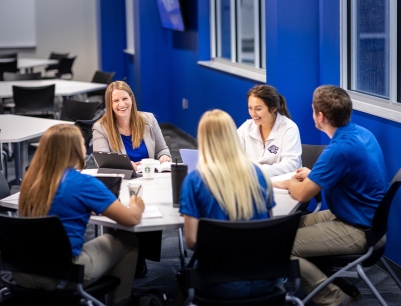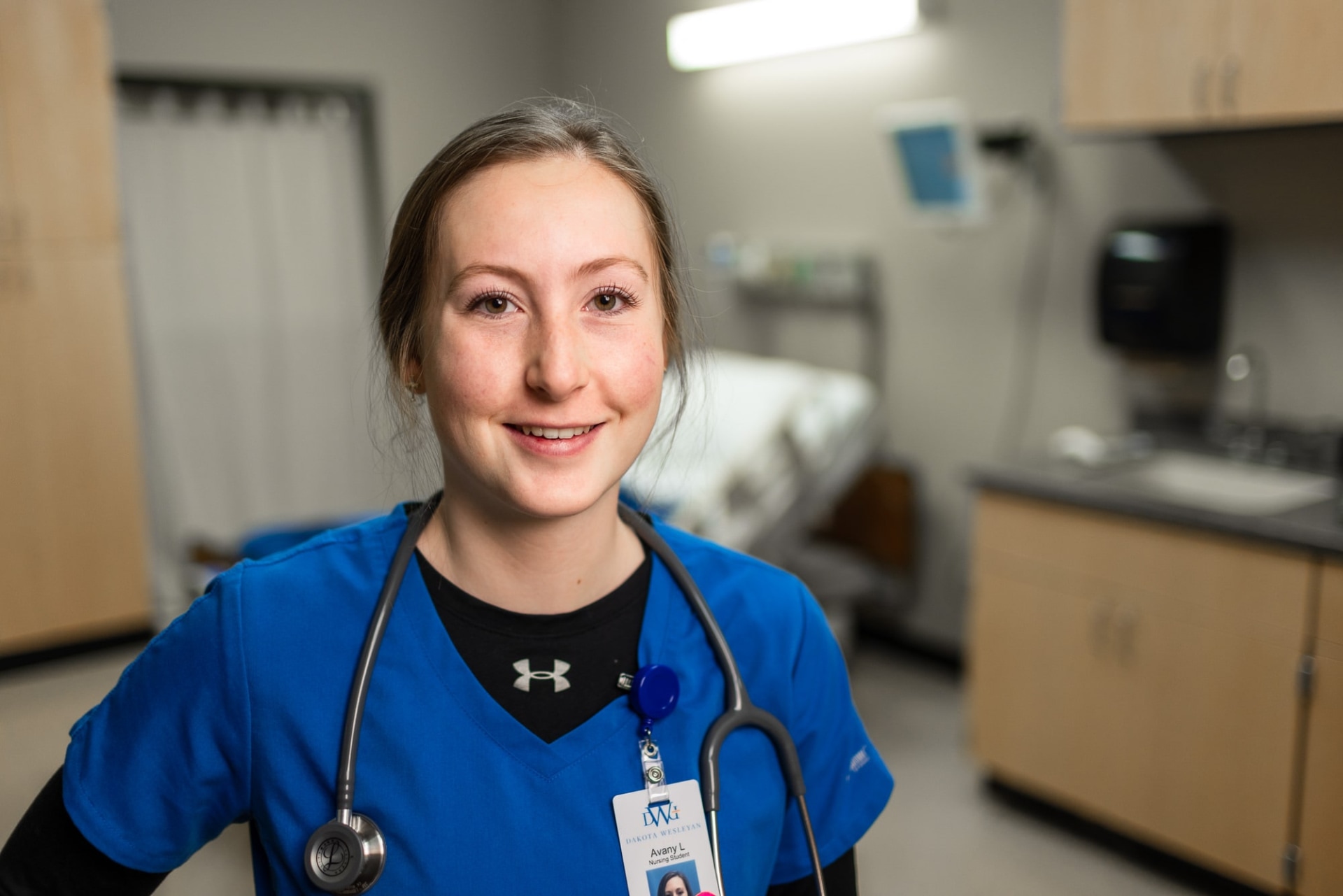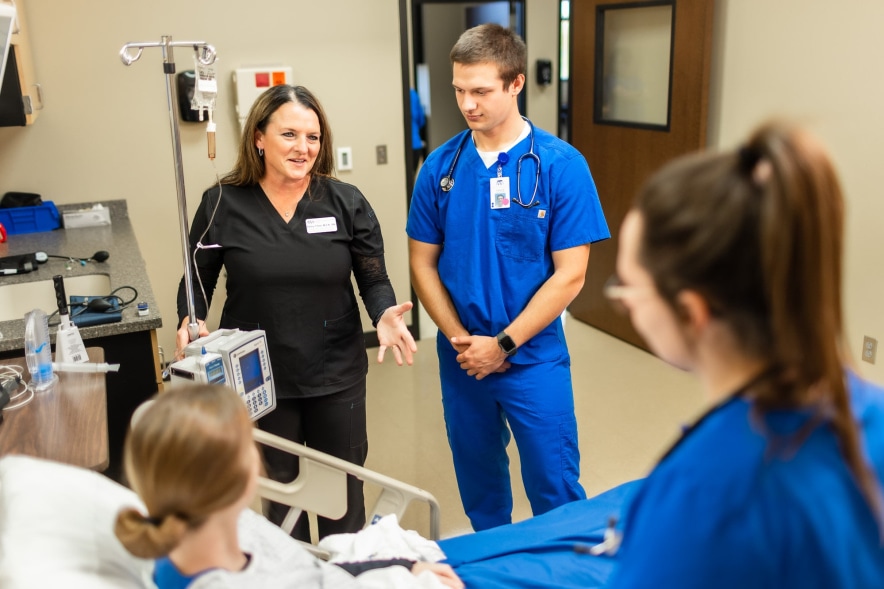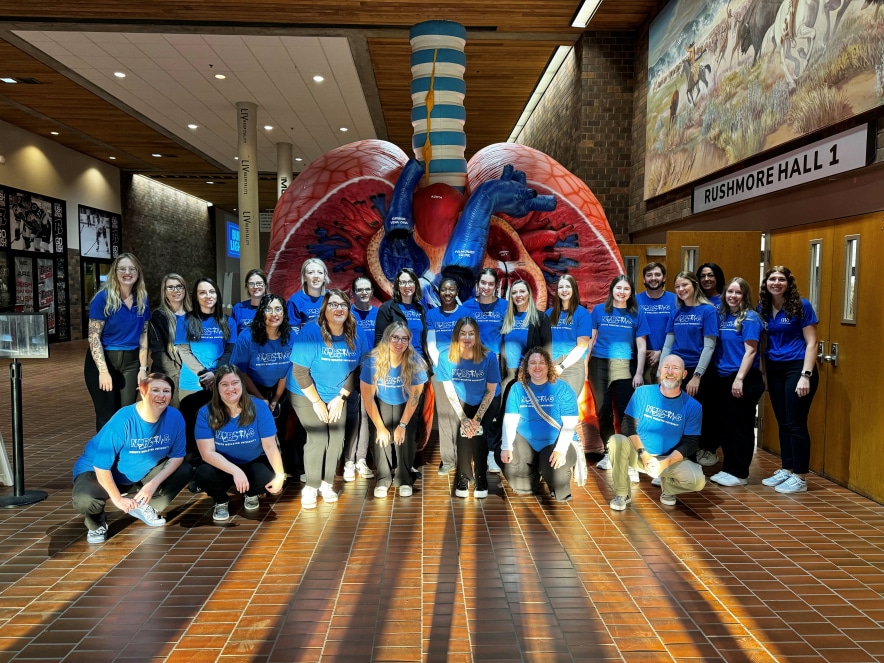A.S. in Nursing
Rapid City
Overview
What kinds of jobs and specialties await you when you earn your A.S. degree?
Hospital nurse
Clinical nurse
Long-term care nurse
Speciality practice nurse
School or community nurse
Care, compassion and community are all part of a DWU nursing degree.
What’s the Difference at DWU?
- You will graduate with an Associate of Science degree in Nursing (A.S.) in just 24 months.
- Incredible job placement opportunities. Organizations want you!
- Your learning will include online class time, in-person classes and simulation-based lessons at our Rapid City nursing site, located at Monument Health, 1400 Turbine Drive, Entrance 9.
- DWU nursing graduates have a high pass rate with the National Council of State Boards of Nursing Licensing Exam for Registered Nurses (NCLEX-RN). After you graduate, you will be ready for the exam.
Accreditation
The new Dakota Wesleyan University A.S. Nursing program has been approved by the South Dakota Board of Nursing, 4305 S. Louise Ave., Suite 201, Sioux Falls, SD 57106-3115, 605-362-2760.
Nursing Admission Requirements
Admission to Dakota Wesleyan's A.S. Nursing Program is competitive. This means that there are more applicants than there are available seats.
Required for admission:
- An official copy of your high school transcript, including cumulative grade point average.
- An official copy of any previous college transcript(s). If coursework is still in progress, attach a current transcript that documents all of the courses in progress from that institution.
-
Priority Admission:
- Students must obtain a cumulative high school or college GPA of 3.0 or greater to be granted priority admission to the program.
-
General Admission:
- Students with a GPA of 2.99 or below will be placed on a holding list until the application deadline of February 1.
- On February 1, all students on the holding list will be assessed and ranked.
- Admission from the holding list will be granted based on GPA ranking, starting from the highest GPA downward, until all available seats are filled.
- Applicants who do not meet the priority admission criteria are encouraged to complete at least six college-level credits in a single semester to strengthen their application. At least three of these credits must be in math or science.
- Final admission decisions are subject to the program’s capacity and compliance with accreditation standards.
Post-Admission Requirements
All costs associated with the following requirements are the student’s responsibility.
- Immunizations and Immunization Records
- Immunizations and immunization records are required prior to participating in clinical rotations. These include (2) MMR or titers proving immunity, Hepatitis B series & Hepatitis B Titer (Hep B Surface Antibody), Tdap vaccinations, Varicella vaccination, annual Tuberculosis testing (QuantiFERON TB Blood Test is required), and an annual influenza vaccination. Covid-19 vaccinations are per guidelines/requirements of clinical facilities.
- Physical Evaluation
- Physical evaluation is required for new nursing students (and returning nursing students).
- CPR Certification and Renewal
- Incoming nursing students must be CPR certified. The American Heart Association course, HeartCode® BLS (Basic Life Support for Healthcare Providers CPR) is required. BLS must have a hands-on training component.
- Criminal Background Check
- Department of Nursing requires criminal Background checks on all incoming, accepted nursing students. Background checks are completed before taking the first nursing course and before beginning clinical rotations in a health care agency. Instructions will be provided to you upon acceptance.
- Major Medical Health Insurance
- Dakota Wesleyan University's contractual agreements regarding clinical experiences with cooperating agencies require that all nursing students be covered under a major medical health insurance policy throughout the entire calendar year. If you are 26 or under and are covered under a parent’s medical insurance policy, you will need to verify with your parent’s insurance agent that coverage applies to you while attending DWU.
Our next cohort begins August 2026!
You can do this.
Our nursing programs are among the best in the region. That's because nursing students work together closely to create a community of support, not just with peers, but also with faculty and staff. You will find the classwork, clinical work and study support to help you achieve your dream of becoming a nurse.
Want more information? Let's connect!
Nursing Courses
You get the best of both worlds. Your classroom simulations will be mixed with online courses. Courses will include topics like anatomy, chemistry, leadership, managment, medical terminology, nutrition, psychology and even philosopy and ethics. A total of 72 credits are required for graduation.
NUR 217 Introduction to Nursing (A.S.)
NUR 310 Fundamentals of Nursing Concepts I (A.S.)
NUR 316 Nursing Concepts in Pathophysiology (A.S.)
NUR 320 Fundamental Nursing Concepts II (A.S.)
NUR 321 Health Assessment Nursing Concepts (A.S.)
NUR 326 Nursing Concepts in Pharmacology (A.S.)
NUR 342 Mental & Social Health Nursing Concepts (A.S.)
NUR 408 Advanced Nursing Concepts (A.S.)
NUR 411 Lifespan Nursing Concepts I (Maternal/Women) (A.S.)
NUR 412 Lifespan Nursing Concepts II (Pediatrics) (A.S.)
NUR 423 Complex Nursing Concepts (A.S.)
NUR 425 Intro to Population Health (A.S.)
NUR 450 Transition into Professional Practice (A.S.)
Review the A.S. Plan of Study and visit with your admissions counselor to discuss your options.
The DWU Difference
When asked about their favorite part of nursing school at DWU, Rapid City nursing students shared this:
"I love our teachers! They're great educators and really help their students succeed."
"My classmates and nursing course instructors. I really like the structure of the program."
"The teacher have been so amazing so far - I feel like I've been learning so much!"
Best Nursing Programs in South Dakota
> RegisteredNursing.org
The Experience
Clinical experience is critical to your career. We have included clinical opportunities in almost every semester. With clinical hours, you can practice your skills as you learn them.
The A.S. curriculum is designed to develop knowledged-base, leadership and management of care skills needed for a registered nurse (RN) in the current healthcare practice setting.
Nursing Mission Statement, Vision and Core Values
Arlene Gates Department of Nursing Mission Statement
The Arlene Gates Department of Nursing, as an integral part of Dakota Wesleyan University, is aligned with its mission, vision, values, and philosophy. The nursing department aspires to prepare students for meaningful careers in professional nursing within a liberal arts setting. The nursing department aspires to cultivate a challenging learning environment based on Christian values and acceptance of diversity. The faculty foster lifelong learning, professional development, and responsibility to service.
Arlene Gates Department of Nursing Vision
The Vision of the Arlene Gates Department of Nursing is to strategically develop and grow DWU nursing programs to further the practice of professional nursing throughout the region.
Arlene Gates Department of Nursing Core Values
The Mission, Vision and Philosophy of the Arlene Gates Department of Nursing are carried out with guidance from AACN’s Core Competencies for Professional Nursing Education (AACN, 2019). The core values for nursing are human dignity, integrity, autonomy, altruism, and social justice.
Program Learning Outcomes
The Program Learning Outcomes are supported by AACN’s The Essentials: Core Competencies for Professional Nursing Education (AACN, 2019). Based on ten domains that represent the essence of professional nursing practice and expected competencies for each domain, four spheres of care are articulated. The domains, competencies and spheres of care lend a uniqueness to the profession of nursing, and diversity to practice (AACN, 2019) while providing a guide for the nursing curriculum toward outcomes-based learning.
The four spheres of care are:
- disease prevention/promotion of health and wellbeing
- chronic disease care
- regenerative or restorative care
- hospice/palliative/supportive care across the lifespan
The domains and competencies allow the learner to build knowledge, skills, and abilities for entry into professional practice. The Essentials also features eight overarching concepts which are fundamental to professional nursing practice and are integrated within and across the domains and competencies. The Essentials serve as a guide for the DWU nursing programs’ program learning outcomes.
The Program Learning Outcomes are as follows:
- Teach graduates to independently provide culturally sensitive, competent nursing care in a variety of settings guided by a scientific concept-based curriculum and professional accountability.
- Develop graduates who incorporate critical thinking and clinical judgement in the provision of holistic, evidence-based nursing care of clients throughout the lifespan.
- Support graduates in the planning and providing of person-centered, coordinated nursing care that contributes to safe and high-quality care outcomes.
- Facilitate graduates who communicate and collaborate with inter-professional teams, utilize health information technology, incorporate cost-effectiveness, and utilize educational principles to promote wellness and well-being.
- Motivate graduates to be committed to lifelong learning and service, display leadership, and who participate in scholarships that advance the profession of nursing.
- Produce graduates who exhibit caring behaviors and who uphold moral ethical and ethical competence in the practice of nursing.
A.S. Program Costs
Program Tuition: $400 per credit
Nursing Credits (72): $28,800
Nursing Clinical Fee: $2,625
TOTAL TUITION AND FEES: $31,425
Other anticipated expenses (estimated and subject to change):
- Background check: $87 | You must complete a background check within 30 days of the start of the first nursing course. The cost of the background check is your responsibility.
- Uniform: $40 | You are responsible for the purchase of one royal blue scrub uniform. This is an approximate cost.
- Nursing Textbooks: Approx. $3,600 | This includes the cost of nursing textbooks and software for the entirety of the program.
- Other Textbooks: varies based on your schedule and course requirements.
- CPR Certification: $55-$65 | This covers a required CPR course provided by the American Heart Association Basic Life Support for Health Care Providers.
- RN Licensure Fee: $100 | This fee is due to the South Dakota Board of Nursing upon graduation.
- NCLEX-RN Exam: $200 | This is the registration fee to Pearson Testing upon graduation in order to take your exam.
Complete your FAFSA Online
Complete your FAFSA online to begin the financial aid process and to determine the various types of aid you may qualify for to help finance your education. Dakota Wesleyan University’s code for the Free Application for Federal Student Aid (FAFSA) is 003461.
Payment Options
Several payment plan options are available for you:
- Online with a checking account or credit card
- Monthly payment plan
- Check or money order
- PLUS or alternative loan
Scholarship Opportunities
Are you a member of the United Methodist Church? Students enrolled in the program are eligible for the United Methodist Recognition Award, a $1,000 annual scholarship awarded to confirmed members of the United Methodist Church. You must be a member for at least one year and a certification form is required.
Get to Know Your Contacts
You will be supported every step of the way. If you have questions, simply connect with us!
















